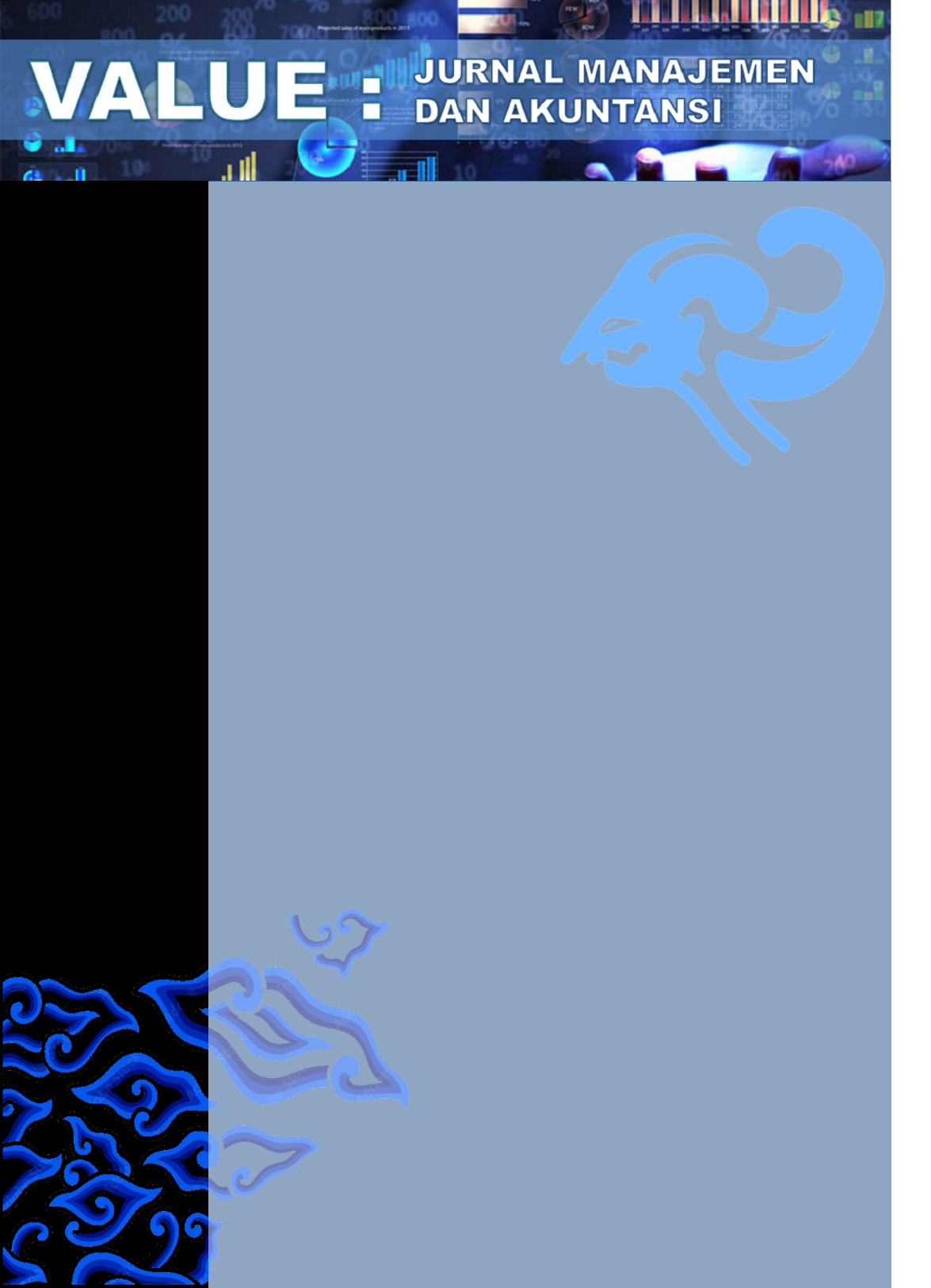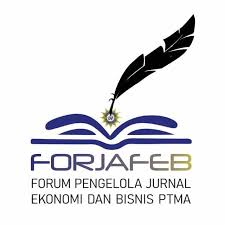Penghindaran Pajak, Income Smoothing Dan Nilai Perusahaan Pada Perusahaan Manufaktur Di Indonesia
DOI:
https://doi.org/10.32534/jv.v18i2.4144Keywords:
Firm Value, Tax, Income SmoothingAbstract
Tax avoidance and income smoothing are important issues that impact the company's operations. The complexity between these two phenomena affects firm value, which is often influenced by family ownership, which influences how manufacturing companies avoid tax avoidance and income smoothing. This study aims to examine the effect of tax avoidance and income smoothing on firm value, with family ownership as a moderating variable. Hypothesis testing was carried out using a multiple regression model with panel data for manufacturing companies listed on the Indonesia Stock Exchange (IDX) for the 2012-2021 period. The results show that tax avoidance has a negative effect on firm value. Tax avoidance is high risk and can reduce company value. This study also found that income smoothing has a positive effect on firm value. Companies tend to do income smoothing to meet market expectations and get benefits in the form of lower debt costs. In addition, this study shows that family ownership strengthens the negative effect of tax avoidance on firm value. However, this study did not find any moderating effect of family ownership on the effect of income smoothing on firm value.
References
Abogun, S., Adigbole, E. A., & Olorede, T. E. (2021). Income smoothing and firm value in a regulated market: the moderating effect of market risk. Asian Journal of Accounting Research, 6(3), 296–308.
Abor, J. (2018). International working capital practices of Ghanaian firms. Acta Commercii, 5(1).
Acharya, V.V. & Lambrecht, B.M. (2015). A theory of income smoothing when insiders know more than outsiders. The Review of Financial Studies, 28(9), 2534-2574.
Agrawal, K., & Chatterjee, C. (2015). Earnings Management and Financial Distress: Evidence from India. Global Business Review, 16(5), 140S-154S.
Arnold, B. J. (2019). International Tax Primer (Fourth). Kluwer Law International.
Aziza, K. (2016). Pengaruh Penghindaran Pajak terhadap Biaya Hutang dengan Kepemilikan Institusional sebagai Variabel Moderasi pada Perusahaan Manufaktur yang Terdaftar di Bursa Efek Indonesia Periode 2013-2015.
Baik, B., Choi, S., & Farber, D. B. (2019). Managerial Ability and Income Smoothing. The Accounting Review, 95(4), 1–22.
Beidleman, C.R., Fletcher, D. & Vesbosky, D. (1990). On allocating risk the essence of project finance. Sloan Management Review.
Bhattacharya, U., Daouk, H. & Welker, M. (2003). The world price of earnings opacity. The accounting review, 78(3), 641-678.
Black, B. S., Kim, W., Jang, H., & Park, K. S. (2015). How corporate governance affect firm value? Evidence on a self-dealing channel from a natural experiment in Korea. Journal of Banking & Finance, 51, 131–150.
Chen, C. L., Weng, P. Y., & Lin, Y. C. (2017). Global Financial Crisis, Institutional Ownership, and the Earnings Informativeness of Income smoothing. Journal of Accounting, Auditing & Finance, 35(1), 53–78.
Chen, X., Hu, N., Wang, X., & Tang, X. (2014). Penghindaran pajak and firm value: evidence from China. Nankai Business Review International, 5(1), 25–42.
Claessens, S., Djankov, S., Fan, J. P. H., & Lang, L. H. P. (2012). Disentangling the Incentive and Entrenchment Effects of Large Shareholdings. The Journal of Finance, 57(6), 2741–2771.
Cook, J., Lewandowsky, S. & Ecker, U.K. (2017). Neutralizing misinformation through inoculation: Exposing misleading argumentation techniques reduces their influence. PloS one, 2(5), 125
Çule, M. & Fulton, M. (2009). Business culture and tax evasion: Why corruption and the unofficial economy can persist. Journal of Economic Behavior & Organization, 72(3), 811-822.
Dang, H. N., Nguyen, T. T. C., & Tran, D. M. (2020). The Impact of Earnings Quality on Firm Value: The Case of Vietnam. The Journal of Asian Finance, Economics and Business, 7(3), 63–72.
De Jong, A., Mertens, G., van der Poel, M. & van Dijk, R. (2014). How does earnings management influence investor’s perceptions of firm value? Survey evidence from financial analysts. Review of Accounting Studies, 19, 606-627.
Demsetz, H., & Lehn, K. (2015). The Structure of Corporate Ownership: Causes and Consequences. Journal of Political Economy, 93(6), 1155–1177.
Desai, M. A., & Dharmapala, D. (2009). Corporate Penghindaran pajak and Firm Value. Review of Economics and Statistics, 91(3), 537–546.
Dyreng, S.D., Hoopes, J.L. & Wilde, J.H. ( 2016). Public pressure and corporate tax behavior. Journal of Accounting Research, 54(1), 147-186.
Faccio, M., Lang, L. H. P., & Young, L. (2011). Dividends and Expropriation. American Economic Review, 91(1), 54–78.
Fariski, H. (2018). Pengaruh Corporate Governance terhadap Manajemen Pajak (Studi kasus pada perusahaan perbankan di BEI pada tahun 2016-2018. Disertasi. Fakultas Ekonomi Universitas Mercu Buana Yogyakarta.
Gaio, C. & Raposo, C. (2011). Earnings quality and firm valuation: international evidence. Accounting & Finance, 51(2), 467-499.
Graham, J.R., Li, S. & Qiu, J. (2012). Managerial attributes and executive compensation. The Review of Financial Studies, 25(1), 144-186.
Hartadinata, O. & Tjaraka, H. (2013). Analisis Pengaruh Kepemilikan Manajerial Kebijakan Utang dan Ukuran Perusahaan terhadap Aggressiveness pada Perusahaan Manufaktur di Bursa Efek Indonesia Periode Tahun 2008-2010. Majalah Ekonomi Universitas Airlangga, 23(3).
Hung, M. & Subramanyam, K.R. (2007). Financial statement effects of adopting international accounting standards: the case of Germany. Review of accounting studies, 12, 623-657.
Jahromi, M. (2012). Transparency of companies and penghindaran pajak. Tesis. Tehran University, Tehran.
Jensen, M. C., & Meckling, W. H. (1976). Theory of the firm: Managerial behavior, agency costs and ownership structure. Journal of Financial Economics, 3(4), 305–360.
Khuong, N. V., Liem, N. T., Thu, P. A., & Khanh, T. H. T. (2020). Does Corporate Tax Avoidance Explain Firm Performance? Evidence from an Emerging Economy. Cogent Business and Management, 7.
Kim, E. H., Maug, E., & Schneider, C. (2018). Labor Representation in Governance as an Insurance Mechanism. Review of Finance, 22(4), 1251–1289.
Kitson, M. and Michie, J. (2014), The deindustrial revolution: the rise and fall of UK manufacturing, Working paper, Centre for Business Research, University of Cambridge.
LaFond, R., Lang, M.H. & Skaife, H.A. (2007). Earnings smoothing, governance and liquidity: International evidence.
Madyakusumawati, Synthia. (2013). Pengaruh efektifitas dewan komisaris dan komite audit, struktur kepemilikan, peran monitoring bank dan siklus hidup perusahaan terhadap probabilita terjadinya fraud. Tesis. Fakultas Ekonomi Pendidikan Ilmu Akuntansi. Universitas Indonesia.
Martinez, A.L. & Ramalho, V.P., (2017). Tax aggressiveness and corporate sustainability in Brazil. Revista Catarinense da Ciência Contábil, Florianópolis, 16(49), 7-16.
Nugroho, W. C., & Agustia, D. (2018). Corporate Governance, Penghindaran pajak, and Firm Value. AFEBI Accounting Review, 2(02), 92.
Park, J., Ko, C. Y., Jung, H., & Lee, Y. S. (2015). Managerial ability and penghindaran pajak: evidence from Korea. Asia-Pacific Journal of Accounting & Economics, 23(4), 449–477.
Pukthuanthong, K., J. Walker, T., Nuttanontra Thiengtham, D., & Du, H. (2013). Does family ownership create or destroy value? Evidence from Canada. International Journal of Managerial Finance, 9(1), 13–48.
Rachmawati, A. & Triatmoko, H. (2017). Analisis faktor-faktor yang mempengaruhi kualitas laba dan nilai perusahaan. Simposium Nasional Akuntansi X, 10(16), 1-26.
Sanjaya, W. (2018). Faktor-faktor yang mempengaruhi income smoothing pada perusahaan manufaktur periode 2014-2016. Jurnal Ekonomi, 23(3), 347-358.
Santana, S. L. L., & Rezende, A. J. (2016). Corporate penghindaran pajak and firm value: evidence from Brazil. Revista Contemporânea De Contabilidade, 13(30), 114.
Sari, Dewi Kartika., Martani, Dwi. (2010). Karakteristik Kepemilikan Perusahaan, Corporate Governance dan Tindakan Pajak Agresif. Simposium Nasional Akuntansi XIII. Purwokerto.
Suandy, Erly. 2016 Edisi 6. Perencanaan Pajak.Jakarta: Penerbit Salemba Empat.
Sudiyatno, B., Puspitasari, E., Suwarti, T., & Asyif, M. M. (2020). Determinants of Firm Value and Profitability: Evidence from Indonesia. The Journal of Asian Finance, Economics and Business, 7(11), 769–778. https://doi.org/10.13106/jafeb.2020.vol7.no11.769
Sulistyanto, S., 2018. Manajemen Laba (Teori & Model Empiris). Grasindo.
Tagiuri, R., & Davis, J. (1996). Bivalent Attributes of the Family Firm. Family Business Review, 10.
Tiago, L., & Calderia, J. (2013). Capital structure, cash holdings and firm value: A study of brazilian listed firms. SSRN Electronic Journal, 9.
Tucker, J.W. & Zarowin, P.A. (2006). Does income smoothing improve earnings informativeness?. The accounting review, 81(1), 251-270.


















